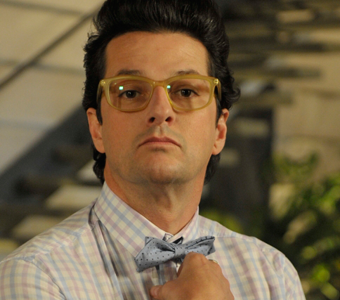Over more than fifty years of history, Brazilian broadcasters have been constant targets of criticism by social entities linked to the preservation of Human Rights for their productions that encourage prejudice and strengthen the status quo. Soap operas and comedies top the list of complaints.
In the book "A TV No Armário", journalist Irineu Ramos Ribeiro addresses this issue as something worrying. For him, "in comedy and entertainment programs, including journalistic programs, broadcasters produce characters who are exaggerated in mannerisms and caricatured in behavior, which does not match the broad reality of the homosexual world."

Television continues to play an important role in Brazilian society. Brazil is one of the countries that consume the most TV in the world: 95% of Brazilians watch television, 73% daily, on average four and a half hours a day, according to data from the latest Brazilian Media Survey, carried out by the Secretariat of Social Communication of the Presidency of the Republic (Secom).
Including the three main broadcasters in the country (Globo, Record and SBT), seven new soap operas will air from Monday to Saturday, without taking into account rerun plots and international productions. Entertainment programs and television news complete the essence of these vehicles' lineup.
Few doubt the power that mass media has in manipulating people, often dictating lifestyles and instilling stereotypes in their subconscious.
Irineu dedicates most of his work to analyzing the news coverage of the main national broadcasters (Globo, Record, SBT, Band, TV Gazeta, Rede TV! and Globo News) of the biggest LGBT visibility event in the country: the Pride Parade LGBT from São Paulo.
According to the journalist, in 99% of cases the newspapers deviate in their articles by not reporting the news fact, that is, the Parade, giving preference to economic and security issues, instead of the importance of the event itself.
The lack of social responsibility and the absence of a political analysis on the type of representation needed is the main problem in the view of blogger and activist Fabrício Longo, who recognizes that there is little LGBT representation in cultural products such as soap operas and series, but states that such vehicles they do not have the "obligation to address the cause", nor is it correct to point to it (television) as the main culprit for the stereotypes, when, in reality, the problem is structural, that is, social.

"Many people complain that TV promotes a stereotype by showing effeminate gay men, but what is the solution to that? Not showing it? Effeminate men don't exist? Or is it that they are not considered a valid representation for a community that still seeks to assert itself through a idolatry of masculinity?", says Longo. "It's obvious that what appears on TV reflects the social niche in which the groups already find themselves. The queer, the black person as a servant, etc., but you can't think of TV as an entity in itself, always with desires and agendas It forms opinions but also reflects (society's thinking)", he adds.
It is undeniable that there has been progress in the approach to lesbians, gays, bisexuals and trans people over the last six years. Small but significant victories were achieved, accompanied by the decision of the Federal Supreme Court (STF) that approved same-sex unions in the country.
BR> There was the first kiss between two men in 2014, starring actors Mateus Solano and Thiago Fragoso in the soap opera "Amor à Vida" (Walcyr Carrasco, TV Globo – 2014), the frequency of same-sex couples in dramas increased and even a scene of sex has already been shown. However, for LGBT filmmaker and film director Lufe Steffen, TV is still the most retrograde and conservative producer of fiction, compared to theater and cinema.
Steffen does not ignore the evolution of the theme in fiction pieces on open TV, but warns of the difference between quantity and quality. According to him, there is still the staleness of the stereotype, the difficulty in creating a more complex LGBT character and the criminalization of gay sex, creating asexual characters, to make the plot more palatable to the conservative public.
"In cinema there is more freedom for screenwriters and directors to be more daring, because there is no concern for the audience. Cinema allows itself more. Sex appears, the characters are more sexualized, provocative. On TV, LGBT characters are chaste. They They take away the sexuality and eroticism as a way of conveying to families watching the image that they are happy cousins and not a couple."
Still according to the filmmaker, both in cinema and on television, there is a deficiency in the treatment of "T" (transvestites, transsexuals, transformers). For him, the "T" universe of the acronym continues to be a mysterious and enigmatic environment, which society has not yet managed to assimilate, therefore, it needs better attention, treatment and representation.



